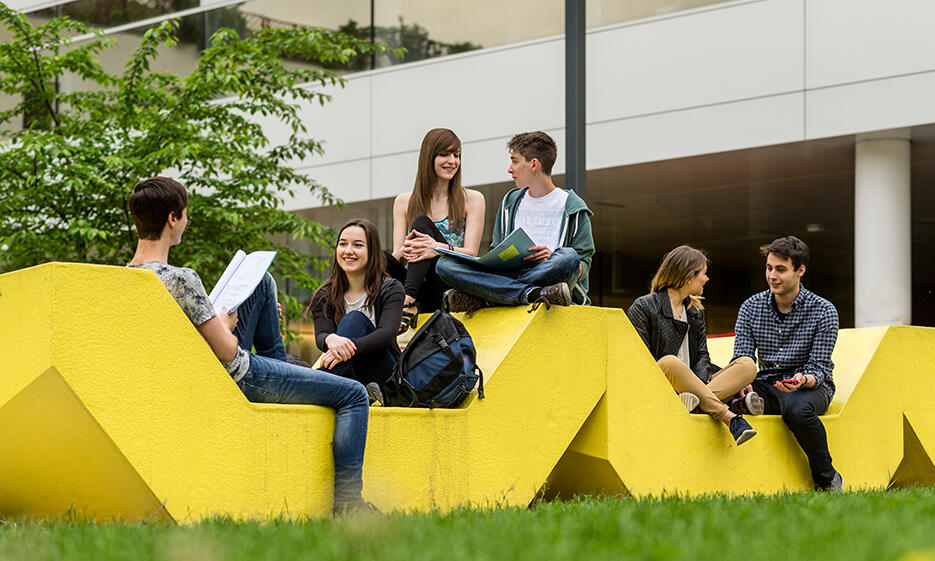Information on all study programmes offered at the University of Innsbruck can be found in the latest edition of Wissenswert.
MA Electrical Engineering
Students of the Bachelor’s Programme in Electrical Engineering now also have the opportunity to pass the Master’s Programme in Electrical Engineering. This new study programme advances the knowledge and skills that enable the students to perform highly qualified, independent and innovative research and development work in essential disciplines in electrical engineering. Students can decide on a specialisation, the choices are “Power Electronics”, “Drive and Energy Engineering” and “Control Engineering, Measurement Technology and Robotics’”. The possibility to pass a Minor (complementary subject area) makes it possible to acquire additional competences. It is planned to offer a Minor in “Biomedical Engineering” as of the 2023/24 winter semester.
Interested students can contact the faculty’s Dean of Study. More information will be posted on the page of the study programme once the curriculum is approved by the Senate.
MA Peace and Conflict Studies
The English-language Master's Programme in Peace and Conflict Studies offers on the one hand a sound scientific education in the field of peace and conflict studies at an international level, and on the other hand it also includes practice-oriented teaching units in teamwork and development, diversity & identity, inclusion and communication, in order to prepare interested students for international fields of activity in the best possible way.
The students’ special qualification lies in the prevention, transformation and dealing with violence in mission-related fields. In addition, graduates should be able to work on practice- and research-related issues using a plurality of approaches, concepts and methods that are linked to the current state of knowledge in peace studies, in a subject-specific, independent and application-oriented manner.
If you wish to pass this Master’s programme, you are subject to an admission process. For more information on the study programme, interested persons can contact the management team, Andreas Oberprantacher and Rina Malagayo Alluri.
Information on the topic of Peace and Conflict Studies can be found here.
MA Pharmaceutical Sciences
This English-language master’s programme aims at training experts who understand the processes required for the development of new drugs in their entirety, and who can apply and successfully implement them in their future professional environment. Persons interested in the Master’s Programme in Pharmaceutical Sciences, a joint study programme of the University of Innsbruck and the Medical University of Innsbruck, can find information on the admission process here.
More information on the curriculum can be found on the study programme’s page.
MA Philosophy of Religion
The new Master’s Programme in Philosophy of Religion is an advanced philosophical education focusing on mankind’s fundamental questions on worldview and religion. It imparts the ability to examine the phenomenon of religion in its various aspects from the perspective of each philosophical discipline and in dialogue with other sciences.
The English-language master’s programme is also aimed at international students. The possibility to complete a Minor (complementary subject area) makes it possible to acquire additional competences.
Students interested in the programme can contact the Associate Dean of Studies at the Institute for Christian Philosophy. More information will be published on the study programme’s page once the curriculum is approved by the Senate.
MA Ancient Worlds
The new Master’s Programme Ancient Worlds provides an education in antiquity. Special attention is paid to contacts between historical cultural areaMA Ancient Worldsd political structures, as well as the resulting insights and conclusions for the present. The methods of historical science, philology and archaeology are used. The students can choose one of six specialisations offered: Ancient History, Ancient Near Eastern Philology, Greek Studies, Latin Studies, Classical Archaeology or Near Eastern Archaeology.
The possibility to pass a Minor (complementary subject area) makes it possible to acquire additional competences.
Students interested in the programme can contact the Associate Dean of Studies at the Institute for Ancient History and Ancient Oriental Studies. More information will be published on the study programme’s page once the curriculum is approved by the Senate.
MA Archaeologies
The new Master’s Programme Archaeologies on the interface of history, culture and natural sciences will start in autumn. In addition to a wide range of different subjects (Prehistory and Early History, Near Eastern Archaeology, Classical Archaeology, Provincial Roman Archaeology, Medieval and Modern Archaeology), the programme offers an extensive selection of cross-disciplinary thematic and methodological modules, such as Digital Archaeology. Using material evidence as the primary source for studying the people of the past, students can delve into such issues as architecture, economics, art and religion. In addition to the theoretical training, however, great importance is attached to the practical component as part of research-guided teaching, i.e. archaeological excavations, work with original finds and excursions to relevant sites and museums.
The possibility to pass a Minor (complementary subject area) makes it possible to acquire additional competences.
Interested students can contact the Associate Dean of Studies at the Institute for Archaeologies. More information will be published on the institute’s website.
